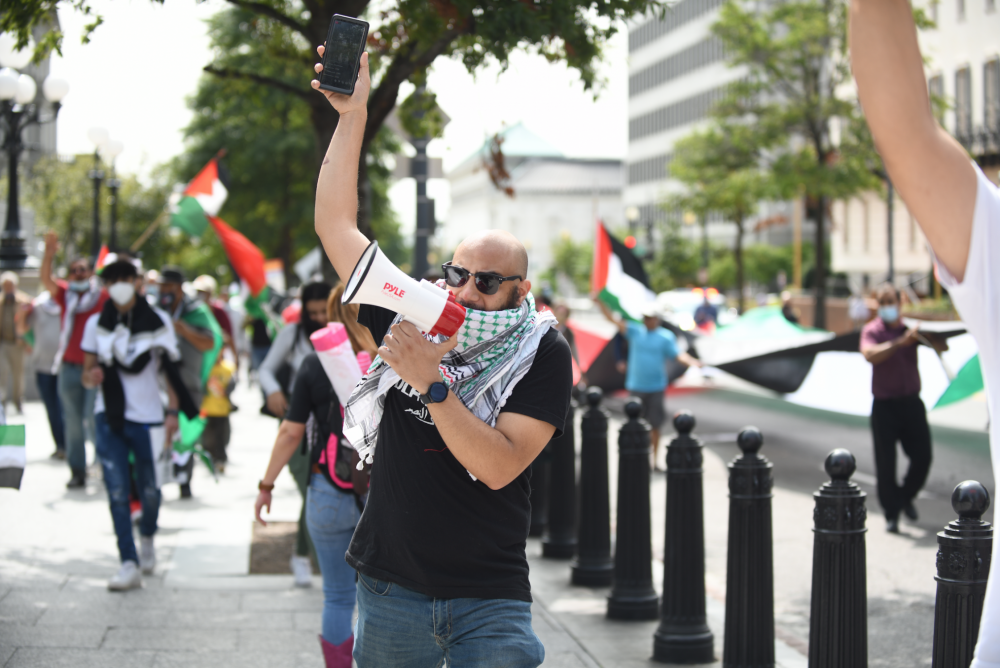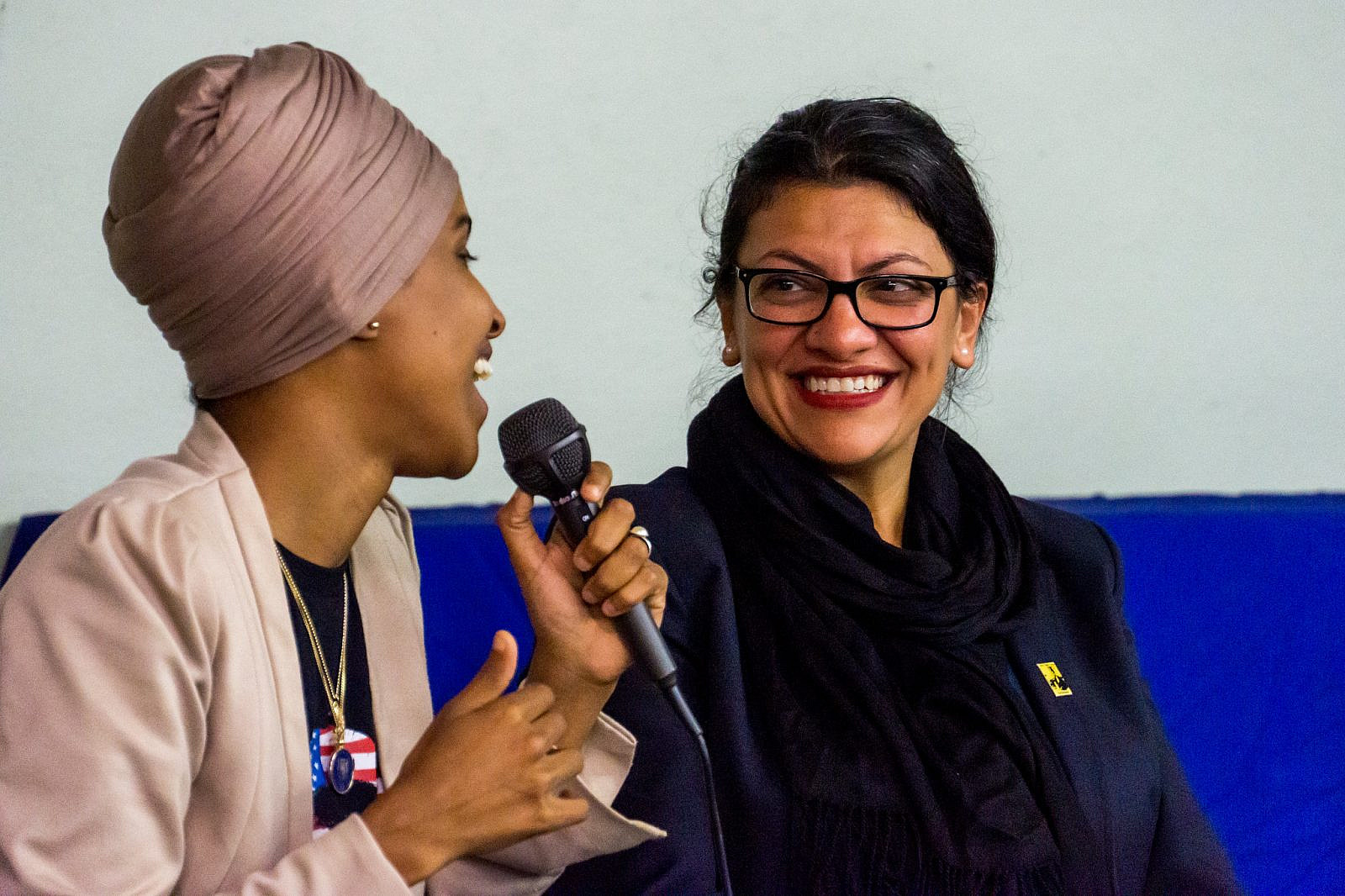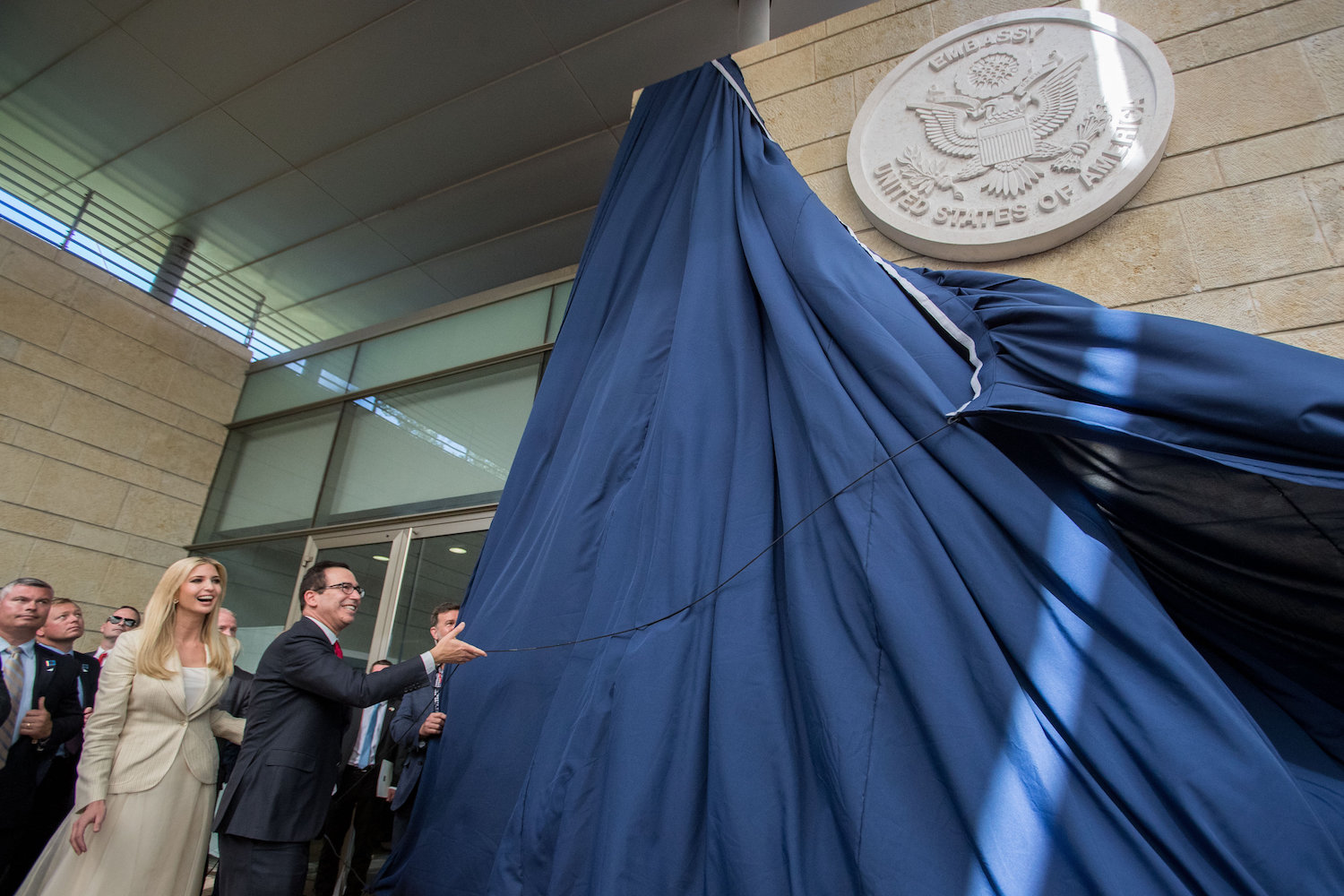Palestinian Americans are voting in droves. But why not from the West Bank?
Disenchanted by U.S. politics and bureaucratic hurdles under occupation, Palestinian Americans in the West Bank struggle to mobilize for the election.
 |
ByHenriette Chacar-November 1, 2020
The past four years in U.S. politics have been demoralizing for Palestinians. President Donald Trump moved the U.S. embassy to Jerusalem, recognized Israeli sovereignty over the occupied Golan Heights, and initiated a Mideast “peace” plan that ignores Palestinians.
During this time, Palestinian Americans still scored unprecedented wins, including the election of Congresswoman Rashida Tlaib, born to Palestinian immigrants, in Michigan. Trump’s victory reportedly encouraged more Arab and Muslim Americans to mobilize. “A lot of people wanted to stand up and say, ‘yes, I am an American,’” says Kefah Abukhdeir, a Palestinian American educator based in Jerusalem.
This excitement, however, can hardly be felt among the approximately few thousand Palestinian Americans residing in the occupied territories, adds Abukhdeir. “It’s two totally different things, what’s going on in the [United] States and what’s going on here,” she says. “We are part of the American tapestry and we don’t realize what power we hold in our hands.”
Abukhdeir, who grew up in Atlanta, Georgia, remembers a time in America “when we [Palestinians] were nothing, when we were constantly told that we didn’t exist.” With representatives like Tlaib and Ilhan Omar, “we actually have our view inside the house now. This is amazing.”
A registered member of the Democratic Party, Abukhdeir got involved with Democrats Abroad, the international arm of the Democratic Party, after Trump was elected in 2016. She has been trying to start a Palestine chapter since, but “a lot of Palestinians don’t feel safe being part of something like this,” she explains. “They don’t want to be on anybody’s radar.”
“A lot of these people are Americans, yes, but they feel like they’re under some type of microscope or magnifying glass, that somebody’s always looking over their shoulder. They feel like there’s some type of Big Brother. That’s why they’re not voting.”
 |
Another disincentive, notes Abukhdeir, is confusion around the voting process. “I think there’s a lot of mystery involved in it. There’s no clear messaging.”
This has been Dareen Ammouri’s experience. For Ammouri, a Palestinian American from Jerusalem, voting as an overseas citizen has been unnecessarily complicated.
“There were different government sites with different information,” says Ammouri. She called the embassy several times, she adds, but “there was nobody here we could talk to.” Only in recent weeks was she able to find all the information she needed on the U.S. Embassy’s website, but by then, “there was no guarantee that all my effort wouldn’t be for nothing, that my vote would actually arrive and get counted.”
‘There must be an easier way to do this’
U.S. citizens living abroad have to register to vote and request an absentee ballot. Each state has its own voting rules and regulations; some allow digital registration, others require citizens to mail in their information. Due to the possibility of mail disruptions under the coronavirus crisis, the U.S. Embassy in Israel has encouraged voters to receive their ballots by email or fax if possible, or consider a private courier service. Voters could also drop off their ballots at the embassy in Jerusalem or its branch office in Tel Aviv at specific times.
Traveling is restricted for Palestinians under occupation. To get to the U.S. Embassy in Jerusalem, Palestinian voters residing in the occupied territories need to have a valid travel permit and cross Israeli checkpoints — a journey that has been made more challenging during the pandemic, and after the Palestinian Authority ended security coordination with Israel last May. The obstacles are even more severe for Palestinians in Gaza, which has been under a 13-year Israeli blockade with extreme restrictions on the movement of people and goods.
Asked about community engagement ahead of elections, and whether anything was done to improve voting access for Palestinians, Keith Hughs, information officer at the embassy’s Palestinian Affairs Unit, wrote: “The Embassy has worked hard to ensure that all U.S. citizens in Israel, the West Bank and Gaza who are eligible to vote in the elections on November 3 are able to exercise their constitutional right to do so. To that end, we conducted robust social media outreach to inform U.S. citizens in our consular areas of responsibility on the process of absentee voting. We held Facebook live sessions and tweeted links to them.”
 |
Ammouri is registered to vote in Texas, where her family lives. “My dad moved to the United States for the American dream. He is business minded, and when he applied for university he realized how few opportunities there are for Palestinians under occupation,” she explains. But as Palestinian residents of Jerusalem, “there is this constant threat that we won’t be able to return,” so members of the family shuttle between Texas and Jerusalem to maintain their residency status.
Given the pandemic, Ammouri hoped voting would be entirely available online. As a Texas resident, however, she can only apply for an absentee ballot by email, but still has to mail in her vote. “It’s not practical. There must be an easier way to do this, which is also more trustworthy,” she says. “The coronavirus has proved that the United States is a Third World country, just in Gucci bags.”
Ammouri strongly felt that it was important to cast her vote. “As a resident of Jerusalem, I can’t vote in any other [national] election. Neither in Israel nor in Palestine. My ability to exercise any constitutional rights and for civic participation exists only this way,” she notes. Being American is more than just a formality for Ammouri; it is part of her identity, she says. “I’m aware that being an American citizen is a privilege, and I want to use it for the better.”
At the same time, Ammouri admits that she has no trust in U.S. political institutions, and does not believe her vote will make a significant difference. Her plan was to vote for the Democratic nominee, not because she is excited at the prospect of a Joe Biden presidency, but to vote Trump out. “Why would I go through all this hassle to vote for someone who I don’t actually believe in, who will not make that big of a change in this place?”
‘It doesn’t take the occupation into consideration’
Mariam Barghouti, a Palestinian writer based in Ramallah, echoes that hesitation. The United States has prioritized “economic prosperity” over Palestinian rights, she says, and this discrimination is not exclusive to Palestinians — “it’s the essence of the system.”
Barghouti was still hoping to vote, but felt “completely disempowered” by the process, she says. Participating in U.S. elections can be a bureaucratic muddle for many voters, even those residing in the United States, but in Palestine, “it becomes an added layer, because it doesn’t take the context of the occupation into consideration.”
According to Sam Bahour, a Palestinian American business consultant based in Ramallah, another reason why Palestinian Americans in the occupied territories seem to be less engaged is because the campaigns ignore them. “They don’t ignore Israelis. They have visits and interest in engaging that community. But whether it’s Biden, Trump, or whoever before them, they don’t see the Palestinian American community as a place to put attention,” he says.
 |
| Palestinians cross the Bethlehem checkpoint, as they head to the Al-Aqsa mosque in Jerusalem’s Old City during Ramadan, May 18, 2018. (Wisam Hashlamoun/Flash90) |
Geographic fragmentation disrupts any ability to organize in Palestine, including around U.S. elections, adds Bahour. “If the checkpoint regime was not in place, and we were able to gather all Palestinian Americans here, I would assume that there’s a critical mass that would get attention,” says Bahour. “But Nablus by itself, Ramallah by itself, Gaza by itself, doesn’t have the ability to get enough attention.”
This physical fracture is a central obstacle to Palestinian political life in general, explains Bahour. “When U.S. elected officials want to visit here, the first thing they say is, ‘where’s your million person march? Where’s your Martin Luther King-like march?’ And I say, well, the people who would march are in jail. And even if they weren’t, they wouldn’t be able to go from place to place because there’s checkpoints and military installations between different communities. So, the geographic fragmentation is not just a theoretical thing, it’s real.”
Bahour, who was born in Ohio, has voted in U.S. elections at least eight times. The process for him this year was straightforward: the voting center received his absentee voter application in January, his ballot arrived in late September, and he mailed it a few days later.
For Bahour, the bigger hindrance is not having a worthy candidate to vote for. “The worse that U.S. politics becomes in general, the less our community seems to be interested in engaging in it,” he says. “And I don’t think that’s limited to our community. I think getting out the vote when people have lost faith and trust and interest is very difficult. That’s why I point to the need for organized efforts. Without organized efforts, people don’t get reengaged.”
Bahour nevertheless voted for Biden. “It’s not about voting for somebody who’s better for the Palestinian cause. It’s about voting for someone who can possibly stop the damage that has been done,” he explains. “We have to get over the bump called Trump.”


No comments:
Post a Comment
Note: only a member of this blog may post a comment.